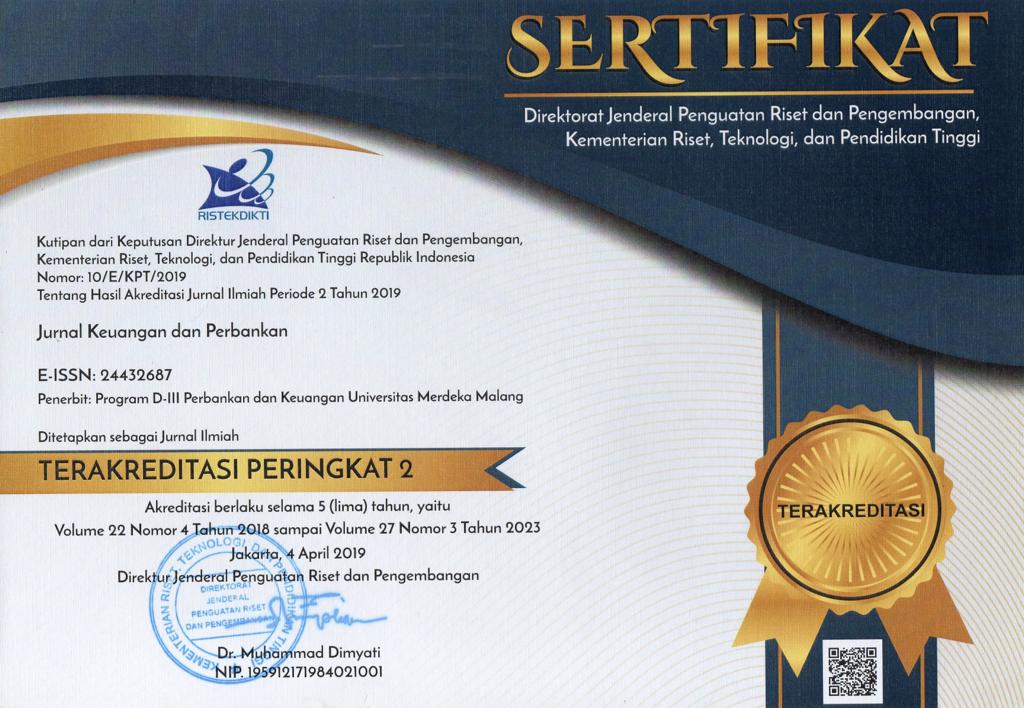Sustainable and responsible investment portfolio performance analysis in Indonesia Stock Exchange
Abstract
This study is intended for knowing the Sustainable and Responsible Investment (SRI) stock portfolio performance in the Indonesia Stock Exchange (IDX). SRI is a concept where the investor is not only considering financial performance, but also non-financial aspects in the company such as Environmental, Social, and Governance (ESG). The main objective of this study is to compare the performance of the SRI portfolio with the performance of comparable portfolios. Is the performance of the SRI portfolio in IDX better than conventional portfolio and Islamic portfolio? To answer this question, the SRI portfolio will be formed from SRI-KEHATI Index (SRI), a conventional portfolio will be formed from the LQ45 index, and the Islamic portfolio will be formed from Jakarta Islamic Index (JII). The performances of those three portfolios will be compared based on alpha value, Sharpe Ratio, Treynor Ratio, and Sortino Ratio. This study result shows that the SRI portfolio performance in IDX is better than the conventional portfolio and Islamic portfolio. That performance occurs because the average of SRI portfolio excess return has positive value during the study period.
JEL Classification: F64, G11, G32
Keywords
Full Text:
PDFReferences
Bodie, Z., Kane, A., & Marcus, A. J. (2018). Investments. Eleventh Edition. New York: McGraw-Hill/Irwin.
Bodhanwala, S., & Bodhanwala, R. (2019). Relationship between sustainable and responsible investing and returns: a global evidence. Social Responsibility Journal, 16(4), 579-594. https://doi.org/10.1108/srj-12-2018-0332
Cunha, F. A. F. S., & Samanez, C. P. (2013). Performance analysis of sustainable investments in the Brazilian Stock Market: A study about the Corporate Sustainability Index (ISE). Journal of Business Ethics, 117(1), 19-36. https://doi.org/10.1007/s10551-012-1484-2
De Velde, E. V., Vermeir, W., & Corten, F. (2005). Finance and accounting corporate social responsibility and financial performance. Corporate Governance, 5(3), 129-138.
Fama, E. F., & French, K. R. (1995). Size and book-to-market factors in earnings and returns. Journal of Finance, 50(1), 131-155. https://doi.org/10.1111/j.1540-6261.1995.tb05169.x
Fama, E. F., & French, K. R. (1996). Multifactor explanations of asset pricing anomalies. Journal of Finance, 51(1), 55-84. https://doi.org/10.1111/j.1540-6261.1996.tb05202.x
Fama, E. F., & French, K. R. (2015). A five-factor asset pricing model. Journal of Financial Economics, 116(1), 1–22. https://doi.org/10.1016/j.jfineco.2014.10.010
Fiskerstrand, S. R., Fjeldavli, S., Leirvik, T., Antoniuk, Y., & Nenadić, O. (2019). Sustainable investments in the Norwegian Stock Market. Journal of Sustainable Finance & Investment, 10(3), 294–310. https://doi.org/10.1080/20430795.2019.1677441
Fitriani, R., & Utama, S. (2001). The performance evaluation of stocks portfolios formed using accounting and market data in the Jakarta Stock Exchange. Gadjah Mada International Journal of Business, 3(3), 367-378.
Foye, J. (2018). A comprehensive test of the Fama-French five-factor model in emerging markets. Emerging Markets Review, 37, 199-222. https://doi.org/10.1016/j.ememar.2018.09.002
Foye, J., & Valentinčič, A. (2020). Testing factor models in Indonesia. Emerging Markets Review, 42, 100628. https://doi.org/10.1016/j.ememar.2019.100628
Giamporcaro, S. (2011). Sustainable and responsible investment in emerging markets: integrating environmental risk in the south African investment industry. Journal of Sustainable Finance and Investment, 1(2), 121-137.
Iqbal, J., & Brooks, R. (2007). Alternative beta risk estimators and asset pricing test in emerging markets: The case of Pakistan. Journal of Multinational Financial Management, 17(1), 75-93. https://doi.org/10.1016/j.mulfin.2006.04.001
Ortas, E., Moneva, J. M., Burritt, R., & Tingey-Holyoak, J. (2014). Does sustainability investment provide adaptive resilience to ethical investors? Evidence from Spain. Journal of Business Ethics, 124(2), 297–309. https://doi.org/10.1007/s10551-013-1873-1
Renneboog, L., Horst, J. T., & Zhang, C. (2008). Socially responsible investment: Institutional aspects, performance, and investor behavior. Journal of Banking & Finance, 32(9), 1723-1742. https://doi.org/10.1016/j.jbankfin.2007.12.039
Rollinger, T. N., & Hoffman, S. T. (2013). Sortino: A ’Sharper’Ratio. Chicago, Illinois: Red Rock Capital.
Sauer, D. A. (1997). The impact of social-responsibility screens on investment performance: evidence from the Domini 400 social index and Domini Equity Mutual Fund. Review of Financial Economics, 6(2), 137-149. https://doi.org/10.1016/s1058-3300(97)90002-1
Sethi, S. P. (2005). Investing in socially responsible companies is a must for public pension funds: Because there is no better alternative. Journal of Business Ethics, 56(2), 99-129. https://doi.org/10.1007/s10551-004-5455-0
Syed, A. M. (2017). Socially responsible: Are they profitable? Research in International Business and Finance, 42, 1504-1515. https://doi.org/10.1016/j.ribaf.2017.07.090
DOI: https://doi.org/10.26905/jkdp.v24i3.4338
Refbacks
- There are currently no refbacks.
Jurnal Keuangan dan Perbankan (Journal of Finance and Banking)
Diploma Program of Banking and Finance, Faculty of Economics and Business, University of Merdeka Malang
Published by University of Merdeka Malang
Mailing Address:
2nd floor Finance and Banking Building, Jl. Terusan Raya Dieng No. 57 Malang, East Java, Indonesia
Phone: +62 813-3180-1534
Email: jkp@unmer.ac.id
 This work is licensed under a Creative
This work is licensed under a Creative
Commons Attribution-ShareAlike 4.0




